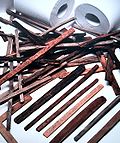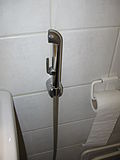Anal hygiene
Anal Hygiene
Anal hygiene refers to the practices and methods used to clean the anus and surrounding area after defecation. Proper anal hygiene is important for maintaining personal health, preventing infections, and ensuring comfort. This article explores the various techniques, cultural practices, and health implications associated with anal hygiene.
Importance of Anal Hygiene[edit]
Maintaining good anal hygiene is crucial for several reasons:
- Prevention of Infections: Poor anal hygiene can lead to infections such as urinary tract infections and anal fissures.
- Comfort: Proper cleaning prevents irritation and discomfort caused by residual fecal matter.
- Odor Control: Effective hygiene helps in controlling unpleasant odors.
- Skin Health: Regular cleaning prevents skin irritation and conditions like pruritus ani.
Methods of Anal Hygiene[edit]
There are several methods used around the world for anal hygiene:
Toilet Paper[edit]
Toilet paper is the most common method used in Western countries. It involves wiping the anal area with paper until clean. However, excessive wiping can cause irritation.
Water[edit]
In many cultures, water is used for cleaning the anal area. This can be done using a bidet, a handheld spray, or simply pouring water with a container. Water is considered more effective and gentle on the skin.
Wet Wipes[edit]
Wet wipes are pre-moistened towelettes that can be used for cleaning. They are often marketed as a more effective alternative to toilet paper, but they can cause plumbing issues if not disposed of properly.
Other Methods[edit]
Some cultures use natural materials like leaves or stones. In modern times, there are also specialized products like cleansing foams and gels.
Cultural Practices[edit]
Anal hygiene practices vary widely across different cultures:
- In many Asian and Middle Eastern countries, water is the preferred method, often using a bidet or a lota (a small water vessel).
- In Western countries, toilet paper is the predominant method.
- Some cultures have specific rituals or customs related to cleanliness after defecation.
Health Implications[edit]
Improper anal hygiene can lead to several health issues:
- Anal Fissures: Small tears in the anal lining caused by rough wiping.
- Hemorrhoids: Swollen veins in the rectal area that can be aggravated by poor hygiene.
- Infections: Bacterial infections can occur if fecal matter is not properly cleaned.
Environmental Considerations[edit]
The choice of anal hygiene method can have environmental impacts:
- Toilet Paper: The production and disposal of toilet paper contribute to deforestation and waste.
- Wet Wipes: These can cause blockages in sewage systems and are not biodegradable.
- Water Use: While water is effective, excessive use can contribute to water scarcity.
Also see[edit]
| Health Topics > A | B | C | D | E | F | G | H | I | J | K | L | M | N | O | P | Q | R | S | T | U | V | W | X | Y | Z |
| View All Health Topics in one page! | Health Encyclopedia | Index of health articles |
Professions:Medicine | Nursing | Pharmacy | Healthcare science | Dentistry | Allied health professions | Healthcare
| Hygiene and sanitation | ||||||||
|---|---|---|---|---|---|---|---|---|
This hygiene-related article is a stub. You can help WikiMD by expanding it.
|
Anal hygiene[edit]
-
Nara period toilet paper
-
Bidet top
-
Bidee shower
-
Japanese toilet bidet
-
Bidet weiss
-
Toilet paper
Ad. Transform your life with W8MD's Budget GLP-1 injections from $49.99


W8MD offers a medical weight loss program to lose weight in Philadelphia. Our physician-supervised medical weight loss provides:
- Weight loss injections in NYC (generic and brand names):
- Zepbound / Mounjaro, Wegovy / Ozempic, Saxenda
- Most insurances accepted or discounted self-pay rates. We will obtain insurance prior authorizations if needed.
- Generic GLP1 weight loss injections from $49.99 for the starting dose of Semaglutide and $65.00 for Tirzepatide.
- Also offer prescription weight loss medications including Phentermine, Qsymia, Diethylpropion, Contrave etc.
NYC weight loss doctor appointmentsNYC weight loss doctor appointments
Start your NYC weight loss journey today at our NYC medical weight loss and Philadelphia medical weight loss clinics.
- Call 718-946-5500 to lose weight in NYC or for medical weight loss in Philadelphia 215-676-2334.
- Tags:NYC medical weight loss, Philadelphia lose weight Zepbound NYC, Budget GLP1 weight loss injections, Wegovy Philadelphia, Wegovy NYC, Philadelphia medical weight loss, Brookly weight loss and Wegovy NYC
|
WikiMD's Wellness Encyclopedia |
| Let Food Be Thy Medicine Medicine Thy Food - Hippocrates |
Medical Disclaimer: WikiMD is not a substitute for professional medical advice. The information on WikiMD is provided as an information resource only, may be incorrect, outdated or misleading, and is not to be used or relied on for any diagnostic or treatment purposes. Please consult your health care provider before making any healthcare decisions or for guidance about a specific medical condition. WikiMD expressly disclaims responsibility, and shall have no liability, for any damages, loss, injury, or liability whatsoever suffered as a result of your reliance on the information contained in this site. By visiting this site you agree to the foregoing terms and conditions, which may from time to time be changed or supplemented by WikiMD. If you do not agree to the foregoing terms and conditions, you should not enter or use this site. See full disclaimer.
Credits:Most images are courtesy of Wikimedia commons, and templates, categories Wikipedia, licensed under CC BY SA or similar.
Translate this page: - East Asian
中文,
日本,
한국어,
South Asian
हिन्दी,
தமிழ்,
తెలుగు,
Urdu,
ಕನ್ನಡ,
Southeast Asian
Indonesian,
Vietnamese,
Thai,
မြန်မာဘာသာ,
বাংলা
European
español,
Deutsch,
français,
Greek,
português do Brasil,
polski,
română,
русский,
Nederlands,
norsk,
svenska,
suomi,
Italian
Middle Eastern & African
عربى,
Turkish,
Persian,
Hebrew,
Afrikaans,
isiZulu,
Kiswahili,
Other
Bulgarian,
Hungarian,
Czech,
Swedish,
മലയാളം,
मराठी,
ਪੰਜਾਬੀ,
ગુજરાતી,
Portuguese,
Ukrainian





